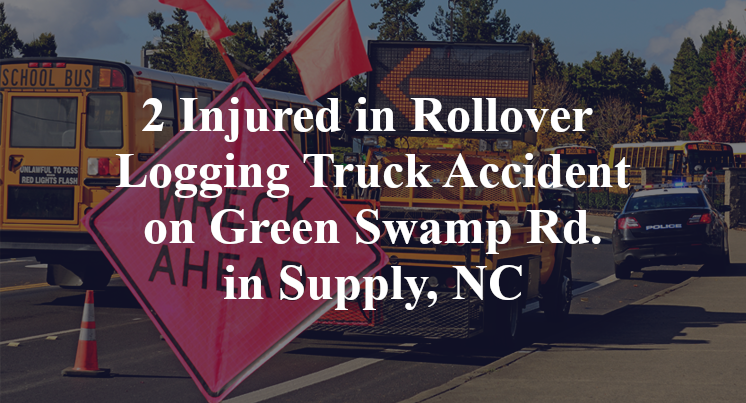2 Injured in Rollover Logging Truck Accident on Green Swamp Rd. in Supply, NC
Brunswick County, NC — June 17, 2025, two people were injured due to a rollover logging truck accident at approximately 11:45 a.m. along Green Swamp Road.
According to authorities, the accident took place on Green Swamp Road in the vicinity north of the Grey Water Road intersection.

Officials indicate that, for as yet unknown reasons, a logging truck was involved in a single-vehicle accident in which it apparently overturned. Two people reportedly suffered injuries of unknown severity due to the wreck and were transported to a local medical facility by EMS in order to receive necessary treatment. Additional details pertaining—including the identities of the victims—are not available at this point in time. The investigation is currently ongoing.
Commentary
When a logging truck flips over and people get hurt, the natural question is: what caused it to roll? Trucks like these are massive, top-heavy vehicles, especially when loaded, and they don’t just tip without a reason. Whether it was driver error, shifting cargo, equipment failure, or road conditions, something pushed that truck past the point of control. The challenge now is figuring out what.
Rollovers Don't Just Happen
Single-vehicle rollovers almost always involve a failure somewhere—mechanical, procedural, or human. So the first step in a case like this is to ask: What was going on inside the cab and under the hood in the seconds before the truck overturned?
That includes:
- Was the driver going too fast for the road or conditions? Logging routes often have sharp curves and uneven pavement, which demand slower speeds.
- Was the cargo loaded correctly? Improperly balanced or loosely secured logs can shift in transit, changing the truck’s center of gravity and causing it to tip.
- Did a tire blowout or brake failure contribute to the loss of control? These aren’t guesses—ECM data and post-crash inspections can confirm or rule out mechanical factors.
I’ve worked on cases where overloaded logging trucks were sent out on narrow rural roads with little more than a glance at a checklist. When something goes wrong, people assume it was a freak accident. But most times, there were warning signs long before the crash.
Was the Company Paying Attention?
If this truck belonged to a commercial logging operation, it’s worth asking what kind of oversight was in place. Did the company make sure the driver was qualified to handle a fully loaded truck? Were routine maintenance checks actually performed—or just signed off? Logging outfits sometimes push hard to meet delivery schedules, and that pressure can lead to cut corners, even on critical safety measures.
Depending on the outcome of the investigation, we may find that the driver did everything right, and the equipment failed them. Or we may learn that the cargo wasn’t loaded securely. Or maybe both. But until someone pulls the truck’s black box data, interviews the driver, and inspects the load securement, we’re just guessing.
Key Takeaways:
- Logging truck rollovers typically result from excessive speed, load shifts, or mechanical failure—all of which require evidence to verify.
- ECM data, load records, and vehicle inspections are essential to determine how and why the truck lost control.
- Driver training and company oversight are relevant if the truck was part of a commercial operation.
- Unsafe loading practices are a known risk in the logging industry and may have played a role.
- A full investigation must look beyond the crash site to evaluate the decisions that led up to it.

“These are essential reads for anyone dealing with the aftermath of a truck wreck”– Attorney Cory Carlson